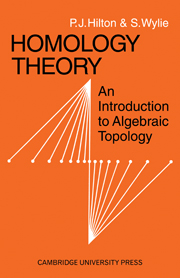Book contents
- Frontmatter
- Contents
- General Introduction
- PART I HOMOLOGY THEORY OF POLYHEDRA
- Background to Part I
- 1 The Topology of Polyhedra
- 2 Homology Theory of a Simplicial Complex
- 3 Chain Complexes
- 4 The Contrahomology Ring for Polyhedra
- 5 Abelian Groups and Homological Algebra
- 6 The Fundamental Group and Covering Spaces
- PART II GENERAL HOMOLOGY THEORY
- Bibliography
- Index
5 - Abelian Groups and Homological Algebra
from PART I - HOMOLOGY THEORY OF POLYHEDRA
Published online by Cambridge University Press: 02 February 2010
- Frontmatter
- Contents
- General Introduction
- PART I HOMOLOGY THEORY OF POLYHEDRA
- Background to Part I
- 1 The Topology of Polyhedra
- 2 Homology Theory of a Simplicial Complex
- 3 Chain Complexes
- 4 The Contrahomology Ring for Polyhedra
- 5 Abelian Groups and Homological Algebra
- 6 The Fundamental Group and Covering Spaces
- PART II GENERAL HOMOLOGY THEORY
- Bibliography
- Index
Summary
In this chapter we bring together the results in the theory of abelian groups J which are relevant to homology theory. Certain of our results will be applicable to the homology theory of finite complexes and may be regarded as classical. Those parts of abelian group theory which are applicable to infinite complexes are of a more recondite nature and constitute, with material in chapter 10, an introduction to Homological Algebra (see [13], [17]). The classical results are intended to illuminate the results of previous chapters; the rest of this chapter should rather be regarded as preparatory for chapters 8, 9 and 10.
All groups in this chapter are abelian and will be written additively. Thus we may suppress the word ‘abelian’; we shall call G an fg-group, or say that G is fg, if Gis a finitely generated abelian group.
Standard bases for chain complexes
In this section our main objective is to obtain standard bases for the chain groups of a geometric fg-complex. In this chapter a chain complex C is said to be geometric(with bottom dimension m) if each Cp is free and, for some integer m, Cp = 0 for all p < m. This slightly generalizes the definition of 3.4. A chain complex C is fg if each Cp is fg. Thus our results will apply to the chain complex C(K) of a finite oriented complex K, and to C(K+). The significant feature of a standard basis is that the homology groups may be read off immediately, and in a particularly convenient form.
We first obtain the fundamental theorem on fg-groups.
- Type
- Chapter
- Information
- Homology TheoryAn Introduction to Algebraic Topology, pp. 158 - 227Publisher: Cambridge University PressPrint publication year: 1960



